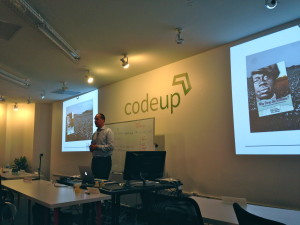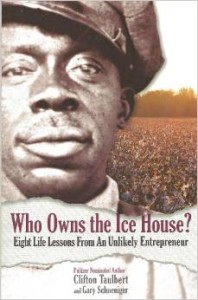By LAURA LOREK
Founder of Silicon Hills News

Photo courtesy of Gary Schoeniger
Entrepreneurship can empower ordinary people to do extraordinary things.
Yet a huge disconnect exists between what is being taught about entrepreneurship and what they are really doing, said Gary Schoeniger, co-founder and CEO of the Entrepreneurial Learning Initiative.
And the myths lead people to the wrong conclusions, he said.
In fact, the typical Inc. 500 startup has no new technology or Intellectual Property and the entrepreneurs are not writing business plans, Schoeniger said.
“They have little or no formal planning,” he said. “Their market research is ad hoc instead of in depth, the median startup capital is about $10,000 coming from credit cards, second mortgages, friends, fools and family.”
And 40 percent have no experience in their chosen field, he said.
Schoeniger could not find a curriculum to explain how entrepreneurs actually operate so he created the Ice House Program. It is based on the book “Who Owns the Ice House” with interviews of more than 300 successful entrepreneurs. He wrote the book with Clifton L. Taulbert, one of the inventors of the Stairmaster. The Ice House Entrepreneurship Program is designed to teach the entrepreneurial mindset.
Peter French, president of Cafe Commerce, brought Schoeniger to San Antonio to teach the program to San Antonio entrepreneurs.
 Schoeniger spoke for two hours Monday night to a group from Café Commerce in San Antonio about the Ice House Program, funded by the Ewing Marion Kauffman Foundation of Kansas City.
Schoeniger spoke for two hours Monday night to a group from Café Commerce in San Antonio about the Ice House Program, funded by the Ewing Marion Kauffman Foundation of Kansas City.
During his talk, Schoeniger dispelled some Silicon Valley stories about entrepreneurs getting rich quick and coming up with earth-shattering innovations. He thinks those stories give people the wrong impression about what it takes to succeed as an entrepreneur. His goal is make entrepreneurship accessible to everyone.
The need for entrepreneurship is huge, Schoeniger said. Studies show that 70 percent of all American workers are not engaged in their work, he said.
“Five us are flapping our paddles in the water and only three of us are pulling the whole boat,” he said.
Jason’s Story
To illustrate how transformative entrepreneurial thinking can be, Schoeniger recounted the story of Jason Campbell. He was a 12-year-old boy in his fourth foster home when Schoeniger met him.
“Jason never knew a father,” he said. “His mom was in prison for the fourth time in his life.”
Schoeniger took Jason in. He went to work on weekends with him at a construction management firm.
At 15, Jason went to live with his mom, but that didn’t last because his mom went back to prison during his junior year.
At the time, Jason had a 1.7 GPA. He dropped out of high school to work at Applebee’s full time. He wanted autonomy.
“I convinced him that movie had already been made and it didn’t end well,” Schoeniger said. “I wasn’t looking to be a hero. I knew the kid. I knew he was bright. I felt like I had no choice but to get custody of him and grab hold.”
Jason enrolled in high school and got a minimum wage job at a construction site. But six weeks into the job, Jason told Schoeniger he hated the job and he wanted to become an entrepreneur.
Schoeniger helped him launch “Jason’s Jobsite Cleanup” with a shop vac, push broom, mop, bucket and some fliers.
Schoeniger told Jason to charge $20 an hour even though Jason normally made $6 an hour.
“That terrified him,” Schoeniger said. It was outside his realm of understanding.
“It’s like I pushed him in the pool,” he said.
Jason spent his first day as an entrepreneur driving around in his 1986 Toyota Corolla looking for a customer. He was afraid to get out of his car. He had a fear of behaving in a way outside of societal norms, Schoeniger said.
When he did approach a group of construction workers, they laughed at him and offered him a job at $8 an hour. Jason said no thanks I own my own business.
“They laughed at him, but he thought that’s survivable,” Schoeniger said.
He kept pitching his service and his pitch got better. He also had to pitch to the decision makers and not the workers. But when he pitched to an owner, the guy turned him down and Jason wanted to lower his price.
“So often when we are behaving in these new ways, we are looking for excuses to go back to the old ways,” Schoeniger said.
The fifth or sixth time he encountered a builder the magic happened, Schoeniger said. The owner gave Jason an address of a house and told him to go there and tell him how much it would cost to clean it.
Jason estimated it would take four hours and offered to do the job for $75. He got the job. It actually took eight hours. But after a few jobs, the man saw Jason was reliable and consistent and he started recommending Jason for other jobs.
Jason hired two of his friends to work for him at $10 an hour. He charged the client $20.
“Which end of that transaction do you want to be on?” Schoeniger asked.
Jason graduated from high school, joined the Marine Corps. Special Forces and served two tours of duty in Iraq. Then he graduated with a B.A. in international relations from San Francisco State University.
Looking back on his experience as an entrepreneur, Jason said the fact that he was reliable was the key to his success. He also saw other people’s problems as opportunities. He would leave the house at 5 a.m. to go clean construction sites before school.
“This was the same job that he hated working for someone else,” Schoeniger said.
The impact of entrepreneurship on Jason was so profound; Schoeniger began teaching a course on entrepreneurship at a local high school. One of his students received a $100,000 contract to clean parking lots.
“I got a call from his father and he asked if there was any way he could take the class,” Schoeniger said.
That’s what led to the creation of the Ice House program, Schoeniger said.

Uncle Cleve is shown on the cover of the Who Owns the Ice House book.
Schoeniger met his co-author Taulbert in Tulsa. Taulbert, who was born to a teenage mom in the Mississippi Delta and picked cotton as a child, learned to be an entrepreneur from his Uncle Cleve.
Uncle Cleve owned the Ice House. He had four other businesses. He had money in the bank but he still drove an old car and people in the community ridiculed Uncle Cleve because he deviated from societal norms.
“It’s very difficult to make entrepreneurship education formulaic,” Schoeniger said.
That’s why Schoeniger dislikes articles in Inc. Magazine, Forbes that assign attributes to entrepreneurship with titles like “Do you have what it takes to be an entrepreneur?”
“They are assigning the wrong cause to the effect,” Schoeniger said.
People need to stop looking at characteristics and instead create the circumstances that allow entrepreneurs to thrive, Schoeniger said.
Entrepreneurs have to survive in resource-constrained environments and they develop traits to do that really quickly.
“It’s up to each of us as individuals to figure out how to do something useful,” Schoeniger said. “I don’t care if it’s washing windows, curing cancer or making sandwiches.”
Money is a horrible motivator, Schoeniger said.
“Jason hated the job when he was told to do it,” he said. “He was completely immersed in it when he had ownership of it.”
From his research, Schoeniger concluded it’s important for entrepreneurs to hang out with people who are entrepreneurial. They also have to have an entrepreneurial mindset or perspective.
And lastly, the situational facts that will push you down the path are important, Schoeniger said.
“It’s actually an advantage when you have nothing to lose,” he said. “The naiveté works for you.”
That’s because highly uncertain niche opportunities take years of being in the market and just scratching away – that’s how entrepreneurs uncover what’s otherwise undiscoverable, Schoeniger said.
“If you knew how hard it would be you would never get on the path,” he said. “You’re probably better off working for somebody else financially speaking.”
“The Silicon Valley stories pollute our thinking,” he said. “We start to think it should be easy. If I just had the right idea, someone should be throwing money at me.”
In reality, it takes eight years to get to $1 million in revenue.
“It’s not about getting rich quick,” he said.
![]() Cafe Commerce, the nonprofit focused on helping entrepreneurs in San Antonio and Dreamit Ventures of Austin have just won U.S. Small Business Administration grants.
Cafe Commerce, the nonprofit focused on helping entrepreneurs in San Antonio and Dreamit Ventures of Austin have just won U.S. Small Business Administration grants. 
